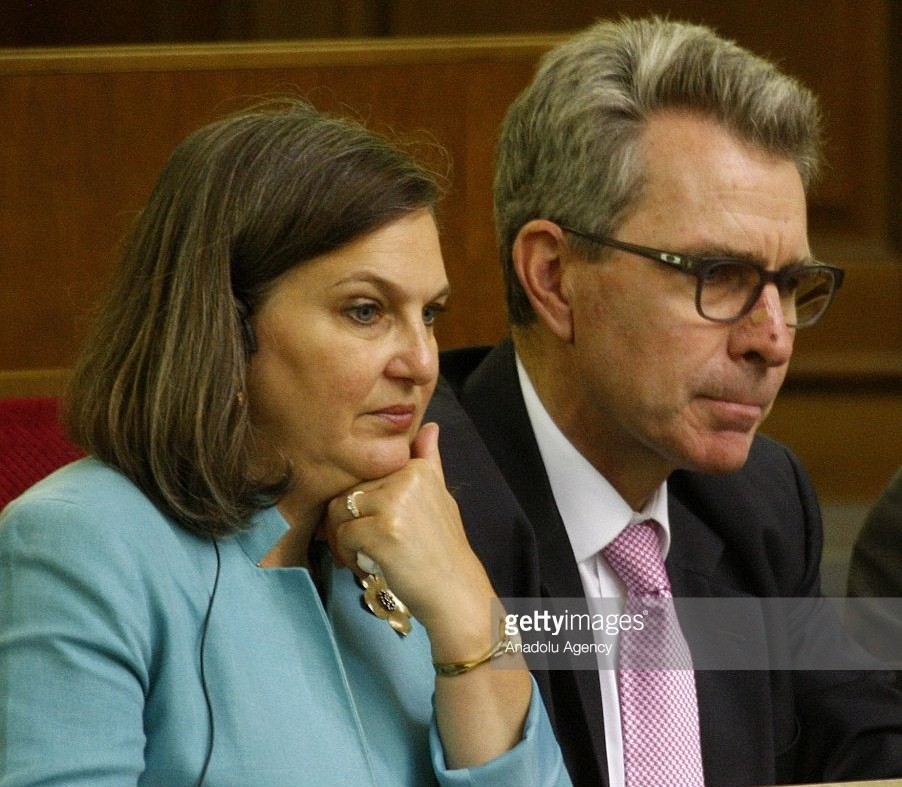
Ukraine Accepts Constitutional Amendment to Russia’s Advantage at US Insistence
Publication: Eurasia Daily Monitor Volume: 12 Issue: 139
By:

The international context of negotiations to implement the Minsk armistice is changing in Russia’s favor. As the leading Western power, the Barack Obama administration effectively pressures Ukraine to legitimize the Donetsk-Luhansk authorities in the constitution and through elections. This would satisfy Russia’s main demands at this stage (with more demands awaiting).
German chancellor Angela Merkel and French President Francois Hollande recently failed to pressure Kyiv into those concessions to Russia (see EDM, July 9, 10). From lower hierarchical rungs, US Assistant Secretary of State Victoria Nuland and Vice President Joseph Biden are pressuring Ukraine more successfully, since US leverage on Kyiv is stronger and tips the balance (see accompanying article).
Increasingly, the object of negotiations is Ukraine’s own constitution—namely, accommodating Russia’s demands to insert its Donetsk-Luhansk proxies into Ukraine’s political system. The focus on Ukraine’s constitution means that Ukraine itself, instead of Russia’s aggression, becomes the object of negotiations. In that sense, the diplomatic process is rapidly turning into negotiations “on,” and potentially “over,” Ukraine.
Western powers now hold Ukraine its to constitutional “obligations”—the new buzzword—vis-à-vis Russia, under the Minsk Two agreement (February 12); although this is no “agreement” but a diktat and not a valid source of Ukrainian “obligations.” Wiggling out of onerous obligations is a standard diplomatic practice; but Western diplomacy does not support Ukraine to wiggle out from political “obligations” to the Kremlin’s Minsk Diktat.
No Western power had ever held Georgia, Moldova or other aggressed countries to political (let alone constitutional) “obligations” toward Moscow or Moscow’s proxies. Ukraine is now experiencing this Western pressure for the first time. While this message is not surprising from Berlin, and certainly not shocking from Paris, it is only Washington that can enforce those “obligations” on Ukraine.
Assistant Secretary Nuland acted as enforcer during her July 15–16 visit to Kyiv. She sounded the “obligations” buzzword more loudly and more frequently than any Western diplomat yet (America House Kyiv news release, Ukrinform, UNIAN, Ukraine Media Crisis Center, July 15–17). Nuland prevailed on President Petro Poroshenko and parliamentary leaders to approve a constitutional amendment that, if confirmed in subsequent votes, would insert Russia’s armed proxies from Donetsk and Luhansk as legitimate players in Ukraine’s political system (see EDM, July 20).
From the Obama White House’s domestic political perspective, Nuland was ideally suited for such enforcement. As the most forward-leaning official of this administration on Ukraine, she enjoys unparalleled confidence in Congress, specifically on Ukraine policy. In Kyiv, it seemed shocking that Nuland of all possible emissaries should demand constitutional concessions to Russia at Ukraine’s expense. But she apparently had her marching orders from the top. That a “mere” US assistant secretary should force the Ukrainian president’s hand, meanwhile, seems normal in Kyiv, reflecting US influence there and Ukrainian reliance on the United States.
Moscow had publicly insisted all along that the US alone holds the leverage to pressure Kyiv into concessions. The Kremlin readily accepted the US proposal to create the US-Russia channel of Nuland and her Russian counterpart, Grigory Karasin, for bilateral handling of Ukrainian matters, without Ukraine and without publicity. This channel is a direct by-product of the Obama White House’s rapprochement with Russia over the Middle East. As the rapprochement advanced closer to fruition over Iran, the Nuland-Karasin channel became increasingly active. Following their meeting in Zurich, on July 9, Karasin declared: “We have agreed to meet periodically in order to exert a constructive influence on Kyiv, to facilitate the fulfillment of these [Minsk] agreements, by Kyiv in the first place. Washington has great influence; we hope that our contacts will allow us to use this influence” (Interfax, RIA Novosti, July 10).
According to Russian media, citing the Ministry of Foreign Affairs, Karasin and Nuland conferred by telephone on July 20 and 22, about “practical matters regarding the constitutional reform in Ukraine.” This was a follow-up to Nuland’s intercession with Kyiv to approve the constitutional amendment that would legalize the secessionist authorities. In this follow-up, Karasin “insisted on a start to direct dialogue between the representatives of Kyiv and those of Donetsk and Luhansk” (Interfax, July 20, 22). While Moscow offers such tidbits on the Karasin-Nuland channel, Washington does not comment—for instance, about Moscow’s assertion that Ukraine’s constitution has become an object of informal US-Russia talks.
Speculation is rife in Kyiv that the Obama administration might short-change Ukraine as a quid-pro-quo for Russia’s “help” (current and prospective) on the Middle East. Asked about this in Kyiv, Nuland replied: “It is offensive to suggest that the US does tradeoffs. The US never trades one thing for another thing in international relations” (Ukrinform, Zerkalo Nedeli, July 16). It may well be that no deal exists, at least not directly; and the indignant rejoinder was perhaps fully sincere. But, according to Serhiy Tolstov of the Kyiv Institute of Political Analysis, the rejoinder in that form and that context “sounded ridiculous to any graduate from international relations courses” (17-07-FP-info, accessed July 24).
President Poroshenko tried very hard, against his own wisdom, to line up the governing coalition behind this constitutional amendment. He resorted to the ultimate argument, far beyond the intrinsic merits of the case: “Do not create with your own hands a situation that would leave Ukraine facing the aggressor one on one” (Ukrinform, July 16). Had Poroshenko been threatened with loss of Western support? Regardless, some deputies from this camp declined to vote for the constitutional amendment, or voted against it, bucking coalition discipline. Conversely, the parliamentary factions that originate in the former Party of Regions genuinely approved this constitutional amendment. The amendment passed thanks to the former Party of Regions deputies; and even so, far short of the constitutional majority that will be required in the final reading.




